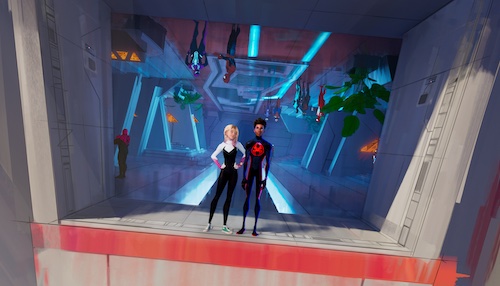
Spider-Man: Across the Spider-Verse wraps us in a web of pure wonder. The animation is resplendent and the emotion is strong in this sequel to 2018's Oscar-winning Into the Spider-Verse, visualising a teeming, multifaceted multiverse populated with all manner of Spider-People. And, in fact, many of them aren't even people at all.
No doubt many of you have already witnessed the ongoing adventures of Miles Morales (Shameik Moore), Gwen Stacy (Hailee Steinfeld) and company. The movie, backed, as before, by LEGO Movie gurus Phil Lord and Chris Miller, takes delirious delight in blowing apart our understanding of the Spider-Man ethos.
Here's our interpretation of the movie's ending that points toward next year's conclusive chapter Spider-Man: Beyond the Spider-Verse (released on March 29th, 2024).
ACROSS THE SPIDER-VERSE SPOILERS AHEAD
Let's start with what we know based on the ending of Spider-Man: Across the Spider-Verse. The frenetic action careens back into Miles' universe – or, at the very least, it appears to. Back in his home district of Brooklyn, Miles is confronted by an alternate version of himself. It turns out Miles' journey into the multiverse has truly messed up the timeline as he's now confronted with a Miles who has taken on the mantle of the villainous Prowler.
The Prowler is known as the alter-ego of Aaron Davis. On Earth-1610 (Miles' original dimension), Aaron was Miles' uncle (voiced by Mahershala Ali) and met a tragic end in Into the Spider-Verse when he was executed by his boss Kingpin (Liev Schreiber) for refusing to kill his nephew.
Across the Spider-Verse makes one thing chillingly clear: Miles is now stranded on Earth-42, the home of the radioactive spider that bit him in the previous movie. It's a world that, according to Miguel O'Hara/Spider-Man 2099 (Oscar Isaac), lacks its own Spider-Man and, therefore, an embodiment of a moral compass.
Earlier in the movie, Miguel informs OG Miles that the death of Miles' police captain father Jefferson (Brian Tyree Henry) has been foretold in the Spidey canon and is incontrovertible. Making it worse, Miguel states that every recently promoted captain in every iteration of the Spider-Verse is destined to die (this extends to both Miles and his allies). To disrupt such a 'canon event' would threaten to rip everything apart.
Given that Miles is now stranded in the Earth-42 universe, he's unable to reach his now-imperilled dad on Earth-1610 where he risks being killed by the villainous The Spot (Jason Schwartzman). On Earth-42, Miles' father has already died, and in his stead is the still-alive Aaron Davis, who has clearly acted as a pernicious, damaging influence on this particular incarnation of Miles.
It seems that the warnings of destiny and pre-determinism put forward by Spider Society leader Miguel have more than a little weight to them. Miles' tragedy is, therefore, what's needed to keep the space-time continuum in balance. It emphasises the dichotomy at the centre of the Spider-Man web: individual sacrifice is needed for the greater good, a philosophy that, earlier in the movie, Miles rejects, causing the multiverse to go into freefall.
Miguel also informed Miles that he was never destined to become Spider-Man. As stated, the world of Earth-42 has no Spider-Man to call its own. It was simply a multiversal accident that caused Miles and said spider to cross paths. But surely this is confirmation of the multiverse principle that anyone can wear the Spider-Man mask? It's just an emergent canonical strand that the defiant Miguel refuses to validate.
What we see play out on Earth-42 at the end of Across the Spider-Verse is, according to Miguel's reading of the situation, the 'official', canonical iteration of Miles' destiny, whatever universe the latter hails from. It's a daring and emotional conceit to smuggle into a freewheeling and entertaining animated adventure, suggesting that we're all just a slender, multiversal web strand away from the division between heroism and villainy.
More to the point, it suggests that we have no autonomy as to where those strands will lead us, or how they connect (even though, as stated, OG Miles' accidental development into Spider-Man violates this principle). Hence why Miguel states that Miles' evolution into Spider-Man has turned him into an aberration, a cosmic fluke, and someone who will never be accepted into the Spider Society. Miles was destined to be born bad and, ironically, his evolution into a hero now makes him the greatest threat the multiverse has ever known.
We await Miles' date with destiny in Beyond the Spider-Verse. But, of course, it's not merely his story. The prologue for Across the Spider-Verse makes it abundantly clear that this is as much Gwen Stacy's story as it is Miles'. Whereas so many of the Spider-Man movies have treated their women characters as disposable, it's Gwen's sense of agency that propels us toward Across the Spider-Verse's end game.
The spectre of Gwen's father's death has also hung large over the events of Across the Spider-Verse (the movie incorporates footage of the death of the live-action version of the character, played by Dennis Leary in 2012's The Amazing Spider-Man). The character of Captain Stacy is, according to Miguel, also destined to die.
However, upon returning to her homeworld of Earth-65, Gwen reconciles with her estranged dad George (Shea Whigham) and discovers that he has already resigned from the police force, shattering the notion of his own manifest destiny. It's the canonical disruption that Miguel appears to fear and yet nothing appears to have come out of it, suggesting that one character's fate very much rests in their hands without fear of reprisal or dire consequences.
Is there hope for the survival of Miles' father on Earth-1610, and is Miguel's reading of the multiversal canon actually misplaced? This, combined with OG Miles' divergent destiny, the very event that has caused Miguel to become so enraged, suggests that the principles of the multiverse aren't as entrenched as they might appear.
Director Kemp Powers told Variety: "It was really important to have this thing where Miles wants to save his dad, but then he's faced with this Pottersville version of a world that was created because of this thing that happened to him.
"It's not going to be as simple as him wanting to just escape this world. He's going to try to do right by people who he feels he's done wrong by, and that just felt more potentially emotional and unpredictable as we go into the third film. It complicates his mission in a way that we hope people find unexpected and also thrilling."
Fellow director Joachim dos Santos elaborated: "The multiverse provides us with these sort of sliding doors. It allows us to ask these questions like the head games you play with yourself: 'If I had done this, instead of that, what happens? How does my life turn out?' You get to see those things play out on screen."
The air punch of a climax sees Gwen returning to Earth-1610 via a portal watch left for her by Hobie Brown/Spider-Punk (Daniel Kaluuya) who, one senses, was never truly happy with Miguel's autocratic attitude. Gwen then assembles the various teams from both Across the Spider-Verse and Into the Spider-Verse: Hobie himself, Pavitr Prabhakar aka Spider-Man India (Karan Soni) and Margo Kess aka Spider-Byte (Amandla Stenberg). They're joined by Peter B. Parker (Jake Johnson), Peni Parker (Kimiko Glenn), Peter Porker aka Spider-Ham (John Mulaney) and Spider-Man Noir (Nicolas Cage).
It's the perfect juncture at which to break the story, foreshadowing the events of Spider-Man: Beyond the Spider-Verse. And beyond the timey-wimey convolutions, we're naturally anticipating which of the Easter Eggs featured in Across the Spider-Verse will play an important role in the future of the franchise.
One of the most significant moments in Across the Spider-Verse involves the brief appearance of the live-action Aaron Davis, played by Donald Glover. To date, he's only turned up in 2017's Tom Holland-starring Marvel movie Spider-Man: Homecoming.
The possibilities are seemingly endless, but might the live-action Aaron and the animated Earth-42 Aaron collide in the next movie? Across the Spider-Verse has demonstrated that the sky truly is the limit when it comes to the conception of the multiverse. Might this also extend to the re-appearance of Tom Holland's Spider-Man within the context of an animated crossover?
It's far more likely that Glover's brief cameo is preparing us for the live-action Miles Morales movie, which Spider-Verse producer Amy Pascal promises is happening. If Shameik Moore is featured (and it's hard to imagine he won't), we'll potentially get an awesome live-action confluence between his Miles, Glover's Marvel iteration of Aaron and, inevitably, Holland's Spider-Man. After all, the last two of those characters have already been established in the context of the same universe.
And, to return to an earlier point, it's not all about Miles. Pascal's fellow producer Ari Arad has intimated that we'll get another Gwen Stacy/Spider-Woman movie, which will arrive "sooner than we expect".
"This is like my dream job, sign me up over and over again," enthuses Steinfeld. "I got to be comfortable! And it’s a dream to be in a space that feels so comfortable but also creative and free and just exciting to be a part of."
Dive into the multiverse again and click the link below to get your Spider-Man tickets.

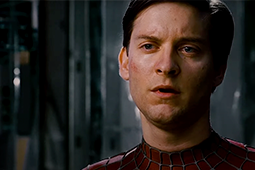

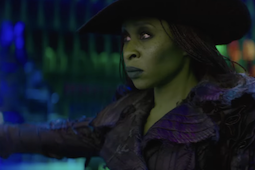




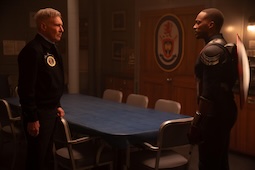
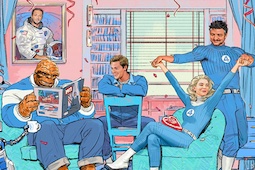



.jpg)
.png)






